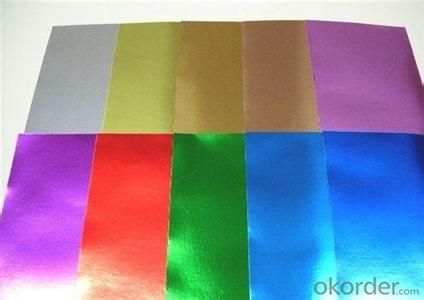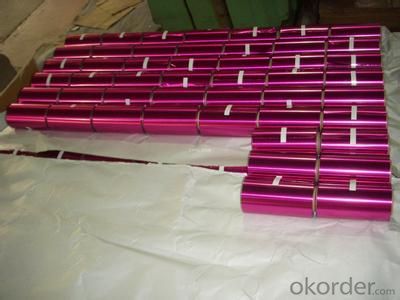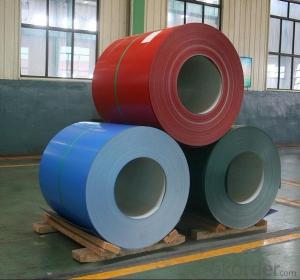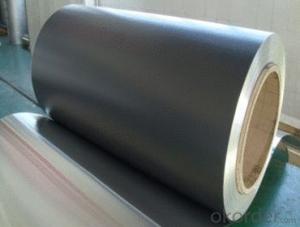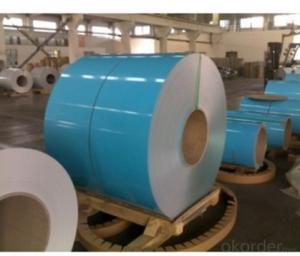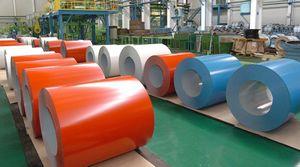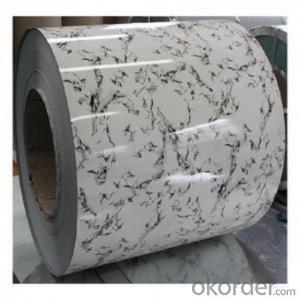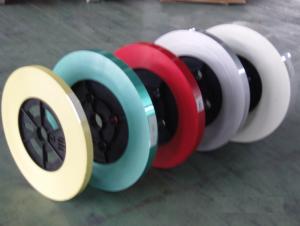Aluminum Painted Coil with PVDF Coating
- Loading Port:
- Shanghai
- Payment Terms:
- TT OR LC
- Min Order Qty:
- 8 m.t.
- Supply Capability:
- 2000 m.t./month
OKorder Service Pledge
OKorder Financial Service
You Might Also Like
Specification
Structure of Aluminium Prower Coating with PVDF Coil/Sheet:
Coated aluminum coil/sheet are of a wide range of colors, which gives wonderful appearance no matter in residential and commercial constructions of great exhibition centers.
The coated aluminum coil/sheet have been widely used in the fields of construction and decoration( garage doors, ceiling etc.), electronic appliances, lighting decoration, air-condition air pipes, sandwich panels and drainages etc.
Main Features of Aluminium Prower Coating with PVDF Coil/Sheet:
1) High flexibility
2) Impact resistance
3) Excellent weather-proof durability
4) Anti-ultraviolet
5) High erosion resist
Images of the Aluminium Prower Coating with PVDF Coil/Sheet:

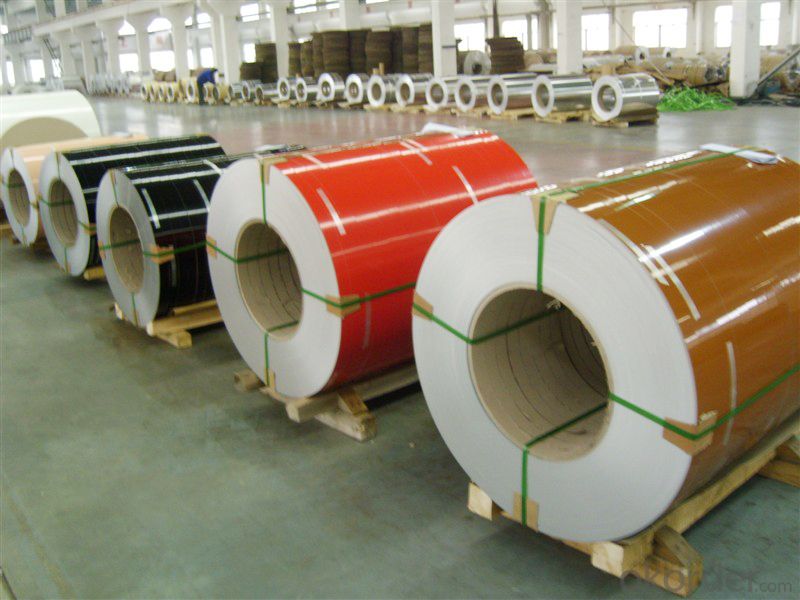
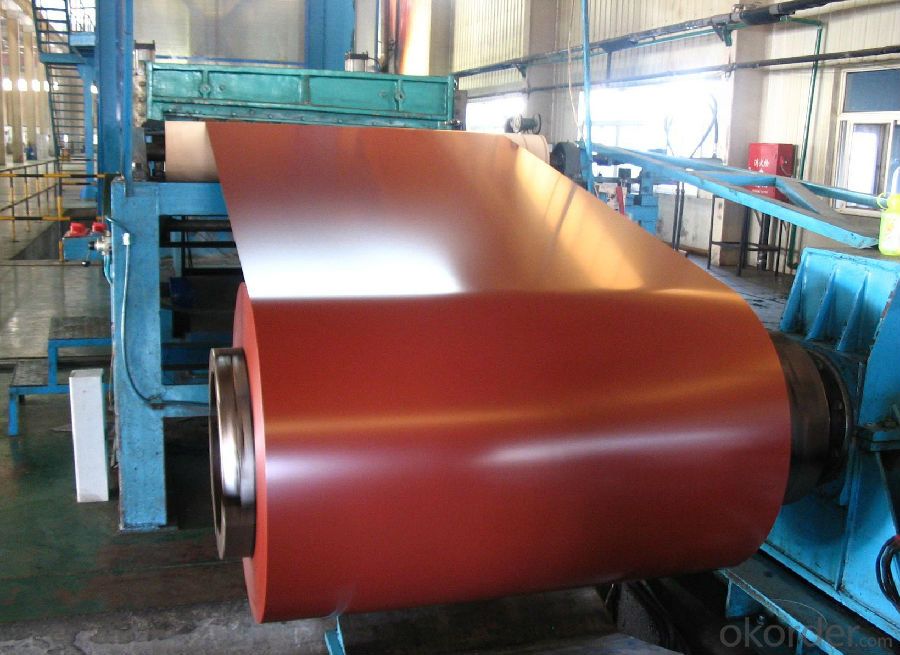
Aluminium Prower Coating with PVDF Coil/Sheet Specification:
Alloy | A1100,A3003,A1050,A8011 etc |
Temper | H16,H18,H24 |
Thickness | From 0.024mm to 1.2mm |
Width | Standard width:1240mm |
Special width:1300mm,1520mm,1570mm,1595mm | |
Diameter | Standard dia:1200mm |
Interior dia:150mm,405mm,505mm | |
Weight | 2.5 T/coil,3.0 T/coil |
Coating | PE, PVDF, AC |
Surface | Embossed, mill finish, coated |
Color | AS to code RAL |
Gloss | 10-90%(EN ISO-2813:1994) |
Coating Thickness | PE: more than 18 micron |
PVDF: more than 25 micron | |
Coating Hardness (pencil resistance) | More than 2h |
Coating adhesion | 5J(EN ISO-2409:1994) |
Impact Resistance | No peeling or cracking(50 kg/cm,ASTMD-2794:1993) |
Flexibility (T-bend) | 2T |
MEK resistance | More than 100 |
FAQ Aluminium Prower Coating with PVDF Coil/Sheet:
a.What is monthly capacity
---CNBM is one stated own company and our monthly capacity is about 2000tons.
b. Now which countries do you export your goods?
---Now we export to South East Asia,Africa, North America,South America ect.
- Q: How are aluminum coils used in the production of automotive radiators?
- Aluminum coils are used in the production of automotive radiators as they provide excellent heat transfer properties. These coils are typically made from aluminum alloy, which is lightweight, corrosion-resistant, and has high thermal conductivity. The coils are formed into a specific shape and then attached to the radiator's core. As coolant flows through the coils, heat from the engine is transferred to the aluminum, which efficiently dissipates it. This helps in cooling the engine and maintaining its optimal operating temperature. Overall, aluminum coils play a crucial role in enhancing the efficiency and performance of automotive radiators.
- Q: What are the potential applications of coil-annealed aluminum coils?
- Coil-annealed aluminum coils have a wide range of potential applications due to their unique properties. They can be used in manufacturing various products such as automotive parts, electronic components, packaging materials, construction materials, and even in the aerospace industry. The annealing process enhances the coil's flexibility, strength, and corrosion resistance, making it ideal for applications where durability, formability, and lightweight characteristics are crucial.
- Q: I was wondering if you could mold clay into a sphere then fill it with aluminum. Then put it over a fire and wait until the aluminum melts then put it in a freezer and it would come out as a sturdy, aluminum sphere. Thanks!
- Do not try this at home! Seriously, this is exactly the kind of process that is used for casting metals. However, you need to have very strong molds with no cracks in them. Also, aluminum presents special problems. Solid aluminum does not corrode the way iron does, because it very quickly forms a protective tough layer of aluminum oxide. But molten aluminum can catch fire, with devastating consequences.
- Q: How are aluminum coils used in the production of heat exchangers?
- The production of heat exchangers heavily relies on aluminum coils, which have a crucial role in the process. Heat exchangers, devices utilized for transferring heat between multiple fluids, are capable of efficiently heating or cooling in diverse applications. The primary reason for employing aluminum coils in heat exchanger production is the distinct properties possessed by aluminum. First and foremost, aluminum serves as an exceptional heat conductor. It exhibits high thermal conductivity, enabling effective heat transfer from one fluid to another. This characteristic plays a pivotal role in heat exchangers, guaranteeing swift and efficient heat exchange. Secondly, aluminum is both lightweight and boasts a high strength-to-weight ratio. Consequently, it is an ideal choice for heat exchangers, facilitating the creation of compact and lightweight units that can be effortlessly installed in various systems. The lightweight nature of aluminum coils also reduces the overall weight of the heat exchanger, which proves advantageous in weight-sensitive applications such as the automotive or aerospace industries. In addition, aluminum coils possess outstanding resistance to corrosion. Aluminum naturally forms a thin oxide layer on its surface, thus safeguarding it from corrosion. This resistance is critical in heat exchangers, which frequently come into contact with diverse and potentially corrosive fluids. By employing aluminum coils, the longevity and durability of the heat exchanger are ensured, averting premature failure or damage. Moreover, aluminum coils are highly malleable, allowing for easy shaping into various sizes and forms. This manufacturing flexibility enables the production of customized heat exchangers tailored to specific applications and requirements. The ability to shape aluminum coils also facilitates the design of intricate heat exchanger geometries, optimizing the heat transfer surface area and enhancing overall performance. To summarize, aluminum coils are extensively utilized in heat exchanger production due to their high thermal conductivity, lightweight nature, corrosion resistance, and malleability. These properties make aluminum an ideal material for efficient heat transfer, compact designs, durability, and customization. Altogether, aluminum coils contribute significantly to the efficacy and reliability of heat exchangers in diverse industries and applications.
- Q: How do aluminum coils perform in high-temperature applications?
- Aluminum coils perform exceptionally well in high-temperature applications. Aluminum is known for its excellent heat conductivity and high melting point, allowing it to withstand extreme temperatures without losing its structural integrity. This makes aluminum coils a popular choice for various industries that require heat transfer and dissipation, such as automotive, aerospace, and HVAC systems. One of the key advantages of aluminum coils in high-temperature applications is their ability to efficiently transfer heat. Aluminum has a thermal conductivity that is much higher than other commonly used metals, such as copper or steel. This means that aluminum coils can quickly and effectively transfer heat from one area to another, ensuring efficient heat dissipation and preventing overheating. Additionally, aluminum has a high melting point of 660 degrees Celsius (1220 degrees Fahrenheit), which is significantly higher than many other metals. This allows aluminum coils to withstand high temperatures without deforming, warping, or losing their structural integrity. Their stability at high temperatures makes them suitable for applications where heat resistance is crucial, such as in engine cooling systems or industrial ovens. Furthermore, aluminum coils are lightweight compared to other metals, which is another advantage in high-temperature applications. Their low density allows for easier handling and installation, reducing the overall weight of the system. This is particularly important in industries like automotive and aerospace, where weight reduction is a significant factor for improving fuel efficiency and overall performance. In summary, aluminum coils are highly reliable and perform exceptionally well in high-temperature applications. Their excellent heat conductivity, high melting point, and lightweight properties make them an ideal choice for industries that require efficient heat transfer, heat dissipation, and heat resistance.
- Q: How do aluminum coils compare to iron coils in terms of weight?
- Aluminum coils are significantly lighter than iron coils.
- Q: This question asks for a comparison between standard and non-standard welding wires used with aluminum coils, highlighting their differences.
- <p>Standard welding wire for aluminum coils is designed to meet specific industry standards, ensuring consistent quality and performance. It is made from high-quality aluminum alloys and is tested for properties like tensile strength, ductility, and resistance to corrosion. Non-standard welding wire, on the other hand, may not adhere to these strict specifications and could be made from lower-grade materials. This can result in inconsistent weld quality, weaker joints, and a higher risk of failure. Non-standard wire may also not provide the same level of corrosion resistance, which is critical for aluminum welding applications.</p>
- Q: Can a rolling machine be utilized to transform aluminum coils into flat sheets?
- <p>Yes, you can use a rolling machine to roll aluminum coils into sheets. Rolling machines are specifically designed to apply pressure and reduce the thickness of metal coils, such as aluminum, into thinner, flatter sheets. The process involves passing the aluminum coil through the rolling mill, where it is compressed between rollers. This process can be repeated to achieve the desired thickness and flatness of the aluminum sheet. It's important to ensure the rolling machine is suitable for aluminum and that the appropriate settings are used to avoid damaging the material or the machine.</p>
- Q: need to know the procedure for removal of aluminum windows with brick trim
- Well, you have three options: 1. Do it right. Remove the brick trim, the paper flashing underneath. pry the nails in the nailing fin out, and remove the window. During install of the new windows, replace the flashings and caulk the gaps. Then replace the brick trim. 2. Retrofit it. There are window systems made now for this case. Essentially, you remove the glass and save the frame. The frame stays in the wall; the new system attaches to it, just inside the old frame. You can get low E glass or even double paned doing this. If energy is your concern, the old frames can be injected with urethane foam during the process. 3. Cut it out tight. Using a Sawzall, cut the frame tight to the brick. Order the new window for block set and caulk the bejeebies out of it. The problem with this approach is that you cannot replace or continue the flashing. You run some real risks of leakage.
- Q: What are the weight considerations when using aluminum coils?
- When incorporating aluminum coils, there are various factors to consider regarding weight. To begin with, aluminum coils generally possess a lighter weight in comparison to other metals, such as steel. This characteristic makes them a favored choice in industries prioritizing weight reduction, like automotive manufacturing or aerospace applications. The lightweight nature of aluminum coils leads to enhanced fuel efficiency in vehicles and increased payload capacity in airplanes. Furthermore, it is important to take into account the weight of the aluminum coil itself. Depending on the specific usage, the coil's weight may need to fall within certain limits to ensure proper functionality and structural integrity. For instance, in HVAC systems, the weight of the aluminum coil must be appropriate for secure mounting and capable of withstanding vibrations or pressure changes. Moreover, the weight of the aluminum coil can impact transportation and installation. Lighter coils are simpler to handle, transport, and install, thereby reducing the time and effort required for these processes. This advantage can be particularly valuable in construction projects that involve a large quantity of aluminum coils. Additionally, it is crucial to consider the weight-bearing capacity of the structures or equipment that will support or utilize the aluminum coils. The combined weight of the coils, along with any additional components or materials, should not exceed the load capacity of the system to prevent structural failure or safety hazards. Lastly, the weight of aluminum coils can influence cost considerations. Since the price of aluminum is typically based on weight, lighter coils may prove to be more cost-effective when compared to heavier alternatives. However, it is important to strike a balance between weight reduction and meeting the required performance and strength specifications. In conclusion, weight considerations when using aluminum coils encompass various factors, including the overall benefits of weight reduction, the weight of the coil itself, ease of transportation and installation, load-bearing capacity, and cost implications. Taking these considerations into account ensures the successful and efficient utilization of aluminum coils in diverse industries and applications.
Send your message to us
Aluminum Painted Coil with PVDF Coating
- Loading Port:
- Shanghai
- Payment Terms:
- TT OR LC
- Min Order Qty:
- 8 m.t.
- Supply Capability:
- 2000 m.t./month
OKorder Service Pledge
OKorder Financial Service
Similar products
Hot products
Hot Searches
Related keywords



